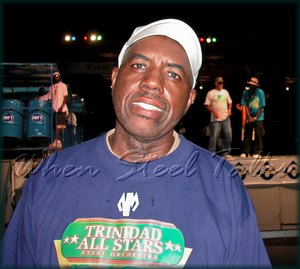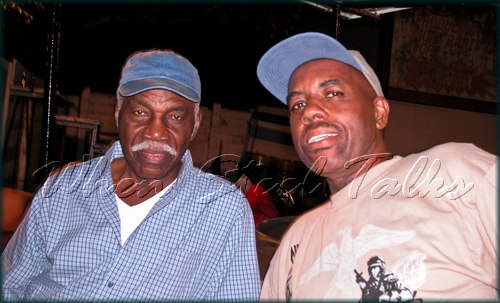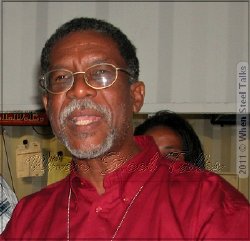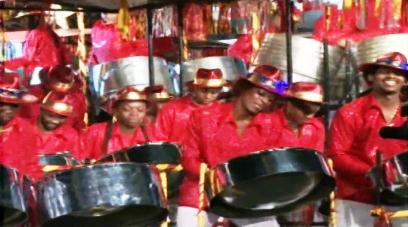Global - To Sharon Edwards, her public and private husband is one and the same.
Cool.

Leon “Smooth” Edwards
Well, Leon Edwards is not known as Smooth in the pantheon of steel band lore for nothing. In the late 60s, Edwards and Clyde Boland, a Trinidad All Stars bandmate, had just exchanged greetings in the pan yard on lower St. Vincent Street.
“How things?” Boland enquired. “Smooth,” Edwards shot back. “He name Smooth,” his friend said, smiling, “Man, he’s smooth.”
Edwards now recalls the game-changer with relish, obviously untroubled by the jangle of distinctive chirps of frogs in the night outside the Curepe home he and his wife share.
They met when two events coincided as if it were pre-ordained. Friends at Holiness Revival Ministries in Port of Spain had coupled them a year or so following the death of his wife, Caludette, from cancer in 2010. Sharon was attracted to his humility and Christian ethics. At first, she didn’t understand the layers of generational fandom pulsing across the land, even rippling like skipping stones across the seas, but as time went by she couldn’t help but notice such adulation - an encore of sorts for his passionate arrangements of Panorama music.
Make no mistake, the Trinidad All Stars ace musician is his own story. Sharon, by extension, has become the embellisher. Still and all, the pair, married in August 2011, function as a team, especially domestically, uniting on household chores and board games whenever Edwards isn’t whiling away the hours playing Solitaire (Patience) on the computer.
“He has a whole world outside of me, and I’m not a part of it,” Sharon tellingly admits.
These days, as the Panorama countdown moves in double-time and Sharon hangs far from the madding crowd, Edwards is set for a different long haul from the card game he loves - the annual post-Christmas rite of life in the pan yard dew. (He may be the only one among the cognoscenti of pan to remind that dew is a source of great fertility, according to Genesis 27:28; and of rich spiritual blessings - Hosea 14:5.)
In the hum of the mid-February overhang of voices and steel jamming together at the Queen’s Park Savannah, these revelations should very well not be deemed lightly as, say, happenstance.
Edwards is poised to become only the third arranger to pull off a Panorama hat trick - three straight championships. Renegades’ Jit Samaroo accomplished the feat (1995-7) from a roller-coaster high; and Clive Bradley of the vaunted Desperadoes was immaculate in succeeding years, 1998-2000.

Trinidad All Stars
For sure, it has become the narrative of a 50-year-old competition that revels in rivalry and its attendant rambunctiousness.
Edwards could rise above all of that. He’s one of a rare breed. Someone who can take charge and encourage others. Apart from his wife, life is his most treasured possession, and he’s privileged to be the person he is. All he can do is to live it out. Like an eternal light, if you ask him. Edwards is so old-school, he’s the kinda fella who’d dream in black and white. Indeed, liming is not an efficient use of his time. No chilling out at the beach, either. Nor alcohol and parties. Be edified with the word, and be careful with what you read or listen to is his dogma.
So religious motifs on the radio tend to backdrop the low drama of home life. The color he hoards bleeds for his music and washes out in the spacious Duke Street pan yard where nightly crowds celebrate his idioms like Phagwa. It is in this festival setting that his other life is renewed.
Born the seventh of eight siblings not far from the Tokyo pan yard, Edwards attended primary school on Besson Street. All he wanted for Christmas was a musical instrument. A harmonica or Xylophone. No soccer ball or toy gun for him. His eldest brother, George, played pan in City Symphony. Another brother, Winston, had joined Dem Fortunates and Solo Harmonites. And when the youngster was 9 years old, he picked up George’s lonesome tenor lying around by the sink in the back of the house at Jackson Hill in Laventille.
Sat on the front step and eked out the melody for Danny Boy.
The music flowing nicely, he wasn’t aware of an audience building outside the wall, and the applause afterward surprised him.
“It was a self-taught experience,” he’s saying now, “because I didn’t know a from b on the pan, but in no time I was able to play.”
Edwards was a scholar, too, at Queen’s Royal College. Even so, in 1968, he found that all the young boys in the area were playing pan, so he joined Trinidad All Stars. Edwards played tenor for a year. In ’69, the band’s music director Jerry Jemmot introduced Mendelssohn’s Fingal’s Cave as its Jouvert Bomb, and to this day Edwards can mouth the sonata structure of the opening motif, a passage meant for the double tenor, which turned out to be his instrument of choice thereafter. But he took the tenor pan home and played along with songs on the radio as a pastime.
Raw talent led to his first arranging gig in 1976 when Hamilton Webb, the band’s captain, tapped him to replace foreign-based Rudy Wells, All Stars’ first victorious Panorama arranger (Rainorama, 1973). Though the band’s performance was good enough for an appearance at the Finals, a couple of years later, some players called for the young gun’s head. Wells was their man, and a disconsolate Edwards began to push plans to migrate to the US with his wife and three daughters, his youngest born from a previous relationship.
“If that’s what they want, I might as well spend some time on me,” he mused.
Woman On The Bass - Trinidad All Stars - Panorama Finals -
1980 Champions
Instead, with Wells still unavailable, he arranged the landmark Scrunter song, Woman on the Bass, in 1980.
“My favorite idea of what a Panorama arrangement should be,” says Les Slater, chair of the Trinidad and Tobago Folk Arts Institute and a former Highlanders arranger. “He was able to masterfully capture the spirit of the song. It was a calling card that he left to let the rest of the pan community and all lovers of pan to know that this was somebody with a lot of substance to him, and he has continued to show us that over the years.”
Edwards allows as how no one nor any genre of music has influenced him.
As with some arrangers, his creativity hangs on vibes, and such attitude could be a throwback to the birth of the instrument when “tuners” struck a serendipitous chord, feeling out a note here and there until the ping pong took shape and matured as the voice of the 20th Century. Phase II’s arranger Len “Boogsie” Sharpe has always been the master of the process. He’d stop “conducting” to chat with a friend, and just so return to the music with a “vibes” or vibrations, or feelings, then proceeding to ladle them out perfectly as good music.
Edwards, however doesn’t totally depend on sensations. Spontaneity ejaculates from a wellspring of solitude and relaxation.
“Sometimes I catch him shaking his head,” Sharon says. “‘Where are you?’ I’d ask. And he would say, ‘a sweet piece of music just pass through my head.’”
Edwards says he grabs at ideas from whatever song he’s working with and allows the idioms to work for him.
“I don’t listen to anybody’s work, strange enough.”
“He hardly looks at television,” Sharon says. “But he’ll listen to video of songs he did. And the crowd reaction, and that spurs him to write or create music for them - that they’d enjoy it. Not him. It’s not about him.
“He understands his source - what he has and the music he creates. And because of that he wouldn’t blow his own trumpet. He depends on that source.
“But he has moments when something would upset him and he’d walk away. He’s not a fairy tale man. He knows how to taper it, though.”
Flying in from the States in 1981 to arrange Super Blue’s Unknown Band, Edwards surely didn’t make for an imaginative lyrical story with magical characters. The reality? If Woman on the Bass were a one-time thing, Panoramaphiles would chalk it up to a fluke. But All Stars’ victories in 1980 and 1981 came in like riders in a photo finish. In 1982, Kitchener’s Heat placed second. Super Blue’s Rebecca ran third a year later. And that story reads more like a fairy tale in itself. You can attribute the machinations involved to Despers’ manager Rudolph Charles, who challenged the band to play All Stars’ Panorama song.
Edwards recounts the drama in the Rama.
“We whipped them from preliminaries to semifinals. On Finals night, Despers turned their back to the North Stand and put everything up front to the Grand Stand. They had a dynamite intro which they brought back for the ending, and slowed the tune a bit. The rest is history.”
Edwards’ arrangements spanned 13 years through 1988, a tensive year for All Stars - seeing that he and seven or so players had carried an edgy relationship with the band. That “little disturbance” pressed Jemmot and his allies to walk away, hard as it was back then for supporters to process the pain. But the incident wasn't as jarring as the split that broke the band apart after the war, with one camp hanging out up the road and another doing business a brisk walk away. Or as unimaginable on Discovery Day thereafter, that a section of the busted band would watch horrified at Rudolph “Fisheye” Ollivierre, All Stars’ first ping pong player on the road, playing pan with rival Invaders, both bands passing each other as they jammed Behind the Bridge, an All Stars player shouting above the din to the renegade, “Look at you, beating pan in Invaders over there when you should be on this side of the road.” History will record on the spot that an apologetic Fisheye unslung his pan and rejoined his Hell Yard buddies to save the day.
So, truth to tell, the Jemmot-Edwards rift with the band didn’t portend a general uprising like that one.
Edwards went on to study music theory for two years at the University of Florida, but “illness” compelled him to fly home. In time, rather than picking up his studies, he chose to read books about music to advance himself, still convinced that his arranging style was a gift.
But toward what end? In 1989, he moved the family to Maryland. A week later, they joined mega-church Evangel Temple in Washington, D.C.
“I gave my life to Christ,” he’s saying now.
And the desire for pan evaporated just like that. He would engage himself by putting his children through college, and not once did he miss arranging. Not for 10 years, despite helping to organize a church steel band for area youths.
Ten years later, a bizarre dream turned up and left a message. If you don’t use it, you’re going to lose it. The only reference, he speculated, was about the music. A revelation indeed! Two days later, an All Stars posse from New York called.
“Smooth, we want you to come back. ‘I said, alright, no big thing.’ They were so accustomed to getting blanked over the years that they didn’t believe me.”
And so this big entourage, is how he remembers the New York side, arrived at his home in Maryland, bringing tapes of the band’s success - the Pan Is Beautiful music festival series, Panorama, Classical Jewels, all of that.
“They came to convince me, but I was already convinced by the dream. So the desire returned.”

Leon “Smooth” Edwards (right) hangs with Neville Jules (left) in All Stars’ pan yard
Beresford Hunte, manager of Trinidad All Stars and an executive board member of the National Carnival Bandleaders Association, concurs with Edwards’ version of the “internal problem,” adding that founder Neville Jules migrated in 1970, “and that wasn’t the end of Trinidad All Stars. It’s still functioning today.”

Beresford Hunte
Hunte hammered away at the bottom line with the candor of a cleric.
“Trinidad All Stars is an institution, not just a steel band. We’re in the heart of the thing. So much so that we close rehearsals with the National Anthem and then form a circle around the band to say a prayer. Every night. Each section a different night,” says Hunte, who ran unopposed as manager for 20 years.
Don Clarke, a composer and professional pan player from Atlanta, gets Hunte’s authoritative role. He’s more focused, though, on the part Edwards plays.
“Smooth wants to be known as the best arranger of Panorama,” Clarke says “He wants to achieve the most wins.

Trinidad All Stars performing Play Yuhself at Panorama 2012
“Play Yuhself, the band’s 2012 song, was difficult for most arrangers, but he took [All Stars’] Clive Telemaque’s tune and won. His ability to arrange is like a homebuilder. He’s a storyteller, too. That’s why you hear the different parts of the arrangement - a story that gravitates to the masters.
“His best was Curry Tabanca, which took people by surprise, and It’s Showtime.”

Trinidad All Stars performing It’s Showtime at Panorama 2011
A real knuckle-buster, Edwin Pouchet’s It’s Showtime showcased the frontline, which roamed like bandits through the song while playing particularly demanding but structured improvisations.
“Besides that, it was the way the choreography meshed with the title and lyrics. [Clive] Bradley had some of those same attributes,” Clarke recalls.
According to Hunte, some “people” didn’t accept Edwards’ compositions in 2009-10. He pointed to Pan Rivalry and Large Is Large, respectively, which placed third. Silver Stars and Phase II ran one-two.
“I won’t tell an arranger what he should play,” Hunte says. “Still, Smooth, like Jules, doesn’t get the recognition he deserves. Smooth’s style is unique. You could hear his handwriting in some other people’s music.”
For now, Edwards has the song, Telemaque’s Bounce and Drive, in hand. He’s got the players, the organization and the sponsors at his back. What is there to be afraid of?
“I have no fear,” he says. “A lot of people wouldn’t want to see me win.”
As John Steinbeck put it in Grapes of Wrath, Edwards is a walkin’ chunk o’ mean-mad.
But the arranger doesn’t expect anybody to get outta his way.
Not even Boogsie Sharpe, his co-worker and friend at the University of Trinidad and Tobago. And he’s wary of the half-a-point syndrome that has separated and bedeviled them, winners and losers both. The judging system appeals to neither. What is half a point? Make a conscious decision, is Edwards’ advice. In a profession that dabbles in the unconscious mind, he’s mindful of the ramifications of a collective conscience.

Leon “Smooth” Edwards in the pan yard
But such forewarning doesn’t seem to faze him. In the “beast” mode, Edwards is driven to admit that “the competition will be keen, and I’m looking forward.”
So when the mark buss after weeks of rehearsals, will he be gyrating through mind-blowing and mind-altering, or vice versa?
Whoa! Keep in mind that Trinidad All Stars make for hardy perennials. And it could well be a productive Panorama night for Smooth and the old Hell Yard band of our times.
Or a long one - like the amphibian symphony playing out right now in the night - as the throats, and the pitch, of the frogs in his backyard have not yet settled down.
Listen to Trinidad All Stars
2013 Tune of Choice - Bounce
and Drive

Dalton Narine
Dalton Narine is a Miami writer and filmmaker, whose worldwide award-winning film Mas Man - The Complete Work, about Peter Minshall, the Trinidad Carnival artist and Olympic Games Opening Ceremonies legend, is available on home video as a three-disc set at masmanthemovie.com
Contact Dalton Narine: narain67@gmail.com
Click for WST’s Trinidad and Tobago Panorama 2013 coverage
Leave a comment in the WST forum






